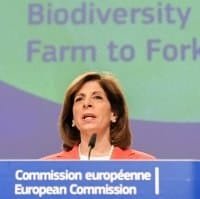(BRUSSELS) – The European Commission took steps towards sustainable biodiversity, food and farming policies Wednesday, as it published its long-awaited ‘form to fork’ policy roadmaps for the next 10 years.
The comprehensive Biodiversity Strategy and the ‘Farm to Fork’ strategy propose EU actions and commitments to halt biodiversity loss in Europe and worldwide and transform Europe’s food systems into global standards for competitive sustainability, the protection of human and planetary health, as well as the livelihoods of all actors in the food value chain.
“The Farm to Fork Strategy will make a positive difference across the board in how we produce, buy and consume our food that will benefit the health of our citizens, societies and the environment,” said the Health Commissioner Stella Kyriakides: “It offers the opportunity to reconcile our food systems with our planet’s health, to ensure food security and meet the aspirations of Europeans for healthy, equitable and eco-friendly food.”
The Biodiversity Strategy tackles the key drivers of biodiversity loss, such as unsustainable use of land and sea, overexploitation of natural resources, pollution, and invasive alien species. Adopted in the heart of the COVID-19 pandemic, the strategy will help prevent and build resilience to future outbreaks and providing immediate business and investment opportunities for restoring the EU’s economy. It also aims to make biodiversity considerations an integral part of EU’s overall economic growth strategy.
The strategy proposes to, among others, establish binding targets to restore damaged ecosystems and rivers, improve the health of EU protected habitats and species, bring back pollinators to agricultural land, reduce pollution, green our cities, enhance organic farming and other biodiversity-friendly farming practices, and improve the health of European forests. The strategy brings forward concrete steps to put Europe’s biodiversity on the path to recovery by 2030, including transforming at least 30% of Europe’s lands and seas into effectively managed protected areas and bringing back at least 10% of agricultural area under high-diversity landscape features.
The actions foreseen in nature protection, sustainable use and restoration will bring economic benefits to local communities, creating sustainable jobs and growth. Funding of EUR 20 billion/year will be unlocked for biodiversity through various sources, including EU funds, national and private funding.
The Commission says its ‘Farm to Fork’ strategy will enable the transition to a sustainable EU food system that safeguards food security and ensures access to healthy diets sourced from a healthy planet. It will reduce the environmental and climate footprint of the EU food system and strengthen its resilience, protecting citizens’ health and ensuring the livelihoods of economic operators. The strategy sets concrete targets to transform the EUs food system, including a reduction by 50% of the use and risk of pesticides, a reduction by at least 20% of the use of fertilizers, a reduction by 50% in sales of antimicrobials used for farmed animals and aquaculture, and reaching 25% of agricultural land under organic farming. It also proposes ambitious measures to ensure that the healthy option is the easiest for EU citizens, including improved labelling to better meet consumers’ information needs on healthy, sustainable foods.
European farmers, fishers and aquaculture producers will get support from the Common Agricultural Policy and the Common Fisheries Policy through new streams of funding and eco-schemes to take up sustainable practices. Making sustainability Europe’s trademark will open new business opportunities and diversify sources of income for European farmers and fishers.
As core parts of the European Green Deal, the two strategies will also support the economic recovery. In the coronavirus context, they aim to strengthen our societies’ resilience to future pandemics and threats such as climate impacts, forest fires, food insecurity or disease outbreaks, including by supporting more sustainable practices for agriculture, fisheries and aquaculture and by addressing wildlife protection and illegal wildlife trade.
The strategies also have important international elements. The Biodiversity Strategy reaffirms the EU’s determination to lead by example in tackling the global biodiversity crisis. The Commission would seek to mobilise all tools of external action and international partnerships to help develop an ambitious new UN Global Biodiversity Framework at the Conference of the Parties to the Convention on Biological Diversity in 2021. The Farm to Fork Strategy aims to promote a global transition to sustainable food systems, in close cooperation with its international partners.
Questions and Answers on Biodiversity Strategy
Questions and Answers on Farm to Fork Strategy
Factsheet on Biodiversity Strategy
Factsheet on Farm to Fork Strategy


